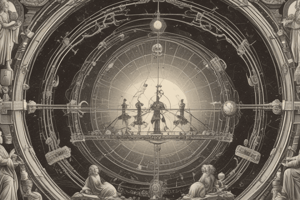Podcast
Questions and Answers
What period saw rapid scientific development in Europe between 1500 and 1750?
What period saw rapid scientific development in Europe between 1500 and 1750?
- The scientific revolution (correct)
- The Copernican revolution
- Ancient times
- Medieval times
Who proposed the idea that all earthly bodies are composed of earth, fire, air, and water?
Who proposed the idea that all earthly bodies are composed of earth, fire, air, and water?
- Nicolas Copernicus
- Ptolemy
- Aristotle (correct)
- Galileo Galilei
Which astronomer challenged the geocentric model of the universe in 1542?
Which astronomer challenged the geocentric model of the universe in 1542?
- Nicolas Copernicus (correct)
- Ptolemy
- Galileo Galilei
- Aristotle
What was the dominant worldview during ancient and medieval times?
What was the dominant worldview during ancient and medieval times?
Which ancient Greek astronomer's model was at the core of the Aristotelian worldview?
Which ancient Greek astronomer's model was at the core of the Aristotelian worldview?
What did the Copernican revolution challenge?
What did the Copernican revolution challenge?
According to Copernicus' heliocentric model of the universe, which celestial body was considered the fixed centre?
According to Copernicus' heliocentric model of the universe, which celestial body was considered the fixed centre?
Why did the Catholic Church initially resist Copernicus' theory?
Why did the Catholic Church initially resist Copernicus' theory?
Which scientist discovered that planets move in ellipses rather than circular orbits?
Which scientist discovered that planets move in ellipses rather than circular orbits?
What did Galileo's telescope discoveries contribute to?
What did Galileo's telescope discoveries contribute to?
What did Galileo refute with his suggestion about freely falling bodies?
What did Galileo refute with his suggestion about freely falling bodies?
Which law proposed by Galileo states that freely falling bodies accelerate uniformly?
Which law proposed by Galileo states that freely falling bodies accelerate uniformly?



